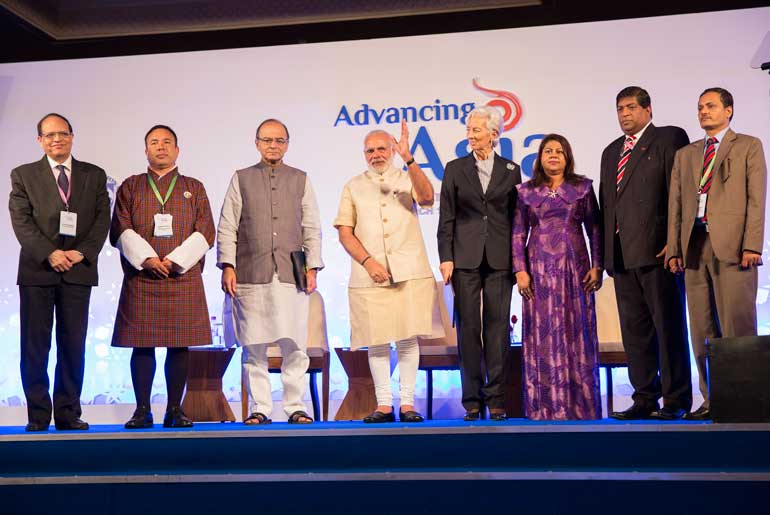Monday Feb 23, 2026
Monday Feb 23, 2026
Monday, 14 March 2016 00:00 - - {{hitsCtrl.values.hits}}
 IMF and India on Saturday agreed to set up the South Asia Regional Training and Technical Assistance Centre (SARTTAC) for the benefit of all countries in the region. The MoU to this effect was exchanged at the opening of the two-day Advancing Asia conference on Saturday in the presence Indian Premier Narendra Modi and several Finance Ministers or Central Bank Governors of South Asian countries. Here Modi waves his hand at the ceremony. IMF Managing Director Christine Lagarde, India’s Finance Minister Arun Jaitley and Sri Lanka’s Finance Minister Ravi Karunanayake are also present
IMF and India on Saturday agreed to set up the South Asia Regional Training and Technical Assistance Centre (SARTTAC) for the benefit of all countries in the region. The MoU to this effect was exchanged at the opening of the two-day Advancing Asia conference on Saturday in the presence Indian Premier Narendra Modi and several Finance Ministers or Central Bank Governors of South Asian countries. Here Modi waves his hand at the ceremony. IMF Managing Director Christine Lagarde, India’s Finance Minister Arun Jaitley and Sri Lanka’s Finance Minister Ravi Karunanayake are also present
By Nisthar Cassim in New Delhi
Prime Minister Narendra Modi on Saturday claimed India doesn’t follow “beggar thy neighbour” policies and has never tried to gain in trade at the expense of its partners.
Modi’s comments, apparently aimed at dispelling accusations that India unduly pushes its weight as a bully of smaller nations in the region, was made at the inauguration of the two-day ‘Advancing Asia: Investing for the Future’ conference organised by the International Monetary Fund (IMF) in New Delhi.
“We have never tried to gain in trade at the expense of our partners. We do not follow ‘beggar thy neighbour’ macro-economic policies. We have never undervalued our exchange rate. We add to world and Asian demand by running current account deficits. We are therefore good Asian and good global economic citizens, and a source of demand to our trading partners,” said Modi, who was the Chief Guest at the opening.
The Indian Premier’s observation is also noteworthy in the context of its plans to forge an Economic and Technological Cooperation Agreement (ETCA) with Sri Lanka.
The conference had participants drawn from Asia and outside including a Sri Lankan delegation led by Finance Minister Ravi Karunanayake and comprising Central Bank Governor Arjuna Mahendran, three other senior officials, Institute of Policy Studies Executive Director Dr. Saman Kelegama and Ceylon Chamber of Commerce Immediate Past Chairman Suresh Shah.
Though he didn’t directly refer to the impending deal with Sri Lanka, Modi’s comments could allay fears among certain sections within Sri Lanka which are vehemently opposing the ETCA despite Government assurance that country’s best interests have been looked into.
During his speech Modi also told the conference, co-chaired by IMF Managing Director Christine Lagarde and India’s Finance Minister Arun Jaitley, that India had a number of cooperative initiatives in Asia.
“We are transforming the ‘Look East Policy’ into an ‘Act East Policy’. Our approach to cooperation is based on flexible geometry. We have integrated in different ways and at different speeds with our neighbours in South Asia, our partners in ASEAN, and our partners in Singapore, Japan, and Korea. We intend to continue doing so,” the Indian Premier said.
“We all want Asia to succeed. I firmly believe that India can contribute to Asian prosperity and development by being economically strong. Amid global problems, I am happy to say that India is a haven of macro-economic stability and a beacon of hope, dynamism and opportunity,” Modi said.
With the IMF regarding India as the “bright spot” and the fastest growing major economy in the world, Modi said he viewed this achievement as a “great privilege and, at the same time, a major responsibility”.
He also emphasised that India had dispelled the myth that democracy and rapid economic growth could not go together. India’s growth rate of over 7% is being achieved in a country that is also a vibrant democracy. Modi also shared with the conference participants some of India’s key achievements in the recent past and priorities for the future.
“My dream is of a ‘Transformed India’. I lay this dream alongside our common dream of an ‘Advanced Asia’ – an Asia where more than half of the global population can live with happiness and fulfilment,” Modi told the Conference.
“Our joint heritage and mutual respect, our common goals and similar policies, can and must create sustainable growth and shared prosperity,” he added.
Focusing on the theme of the conference, Modi touched on two issues: firstly, ‘Why Asia?’ and secondly, ‘How India?’ Why is Asia so important, and how can India contribute?
He said many knowledgeable people have said that the 21st century is, and will be, the Asian Century. “Three out of every five people in the world live in Asia. Its share in global output and trade is now close to one-third. Its share in global foreign direct investment is about 40%. It has also been one of the world’s most dynamic regions,” Modi said.
“Although Asia has slowed down, it is still growing at a rate three times greater than that of the advanced countries. It is, therefore, the ray of hope for global economic recovery,” the Indian Premier added.